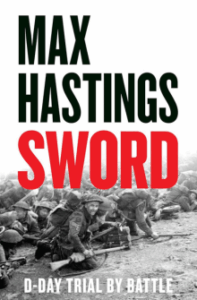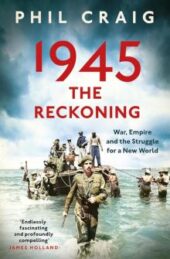A new work by Max Hastings, éminence grise of military historians, is always an eagerly anticipated event. In recent years we have been treated to his brilliant accounts of Vietnam, the Dambusters raid (Chastise), Blockade of Malta (Pedestal), and the Cuban Missile Crisis (Abyss). What characterises Max’s work is the sheer warmth, humanity, and empathy of his writing, interwoven into expertly solid narratives which makes sense of events amidst the chaos of war. (Us armchair generals call him Max by the way.) Sword is a fine example of this and will be enjoyed this summer by military nerds, ordinary readers, and – I very much hope – youngsters, for whom the 1940s seem a very long time ago.
The story of the British action on the easternmost flank of the Normandy beaches, Sword, is well-trodden ground. Beevor, Caddick Adams, James Holland, Steven Ambrose, and dozens if not hundreds of others have tackled this most famous of stories. Indeed, Max has written about D-Day before in his volumes on Overlord (1984) and All Hell Let Loose (2011).
In a nutshell, D-Day, Overlord and Neptune were each “stunning feat[s] of planning, logistics, training, air and maritime organization, and courage”. Sword was the left (most easterly) beach and the operation also required the flank to be secured from the feared mobile Panzer divisions. And so this is a story about innovative landing craft, amphibious tanks and ‘funnies’, surprise glider attacks, and the newly-formed airborne units we now know as Paras. The success of the operation was by no means a foregone conclusion, and delays to the deployment of the Panzers allowed valuable time for the beachhead to be secured.
D-Day is also part of our nation’s story: plucky Britain standing up to tyranny in her last days of empire, embodying values such as courage and selflessness. Whilst this is certainly not a revisionist history, unpicking even the smallest thread of a national myth such as this is going to prompt howls of protest.
As editor of the Telegraph in 1994, Max commissioned a 50th anniversary study of Arnhem. “A fire storm of shot and shell” descended on his defence editor who vowed never to write about Arnhem again whilst General Sir John Hackett (a Brigade Commander in the battle) was still alive.
“D-Day was not as our parents or grandparents generation fondly believed… the decisive event of World War 2”, but it was “the pre-eminent landmark of Britain’s struggle because it represented the moment of resurrection … after all the defeats and humiliations…. since 1940.”
In the same vein he does not shy away from honest appraisal of the conduct of the operation, where it is due. He makes the point that for many soldiers D-Day was their first combat experience. These were well trained, but ultimately inexperienced, troops. Consequently many soldiers stopped or went to ground as soon as they came under fire. Officers took disproportionate casualties attempting to get novice warriors “hurled in the first action of their lives”, to defy logic and to keep moving up the beaches under fire when all their instincts urged them to cling to cover.
The pilots carrying the airborne troops and towing the gliders were also “painfully inexperienced to fulful such a sensitive role”, as they were not drawn from the first rank of fighter or bomber pilots. As a result many airborne troops suffered dangerously erratic flying because of pilots spooked by flak, and many were dropped in the wrong locations.
Chapters on the gliderborne troop landings to secure the critical bridges across the Caen canal and the river Orne are told with a narrative pace. The battles by 9 Para to seize the Merville battery whose guns threatened the beaches reveal the chaos and shifting fortunes of what in the initial hours and days were hard-fought local battles. And, likewise, the efforts by the Suffolks to take the Hillman stronghold outside Colleville-sur-Mer reveal the challenge of persuading terrified men to advance in the face of enemy fire.
In Sword, he sets out the visceral human side of the story, in all its heroics, pain, humour, and pathos. The result is as good as any novel or made-for-TV drama. Charmingly human moments include the café of Georges and Thérèse Gondrée which becomes a sanctuary of champagne and solace amidst the carnage of the first days in Normandy.
This is a story with a cast of great characters, from the eccentric Lord Lovatt, ‘Windy Gale’, the commander of 6 Airborne Division, and, of course, Montgomery, but also the ordinary allied and enemy soldiers, civilians, children, and farm animals. Ultimately we know how this story ends: “Whatever the professional battlefield skills of the German Army, the wider Allied war machine functioned incomparably better than did that of Hitler.”
Sir Max has produced a classic which deserves wide readership 81 years after this incredible turning point in history, and which should remain in print for generations to come.
Justin Doherty is a classicist, former army officer and advisor to governments on crises and complex situations.







